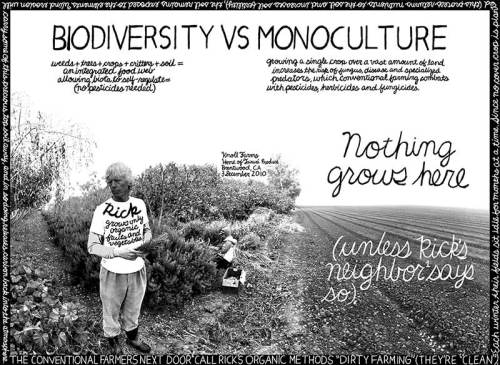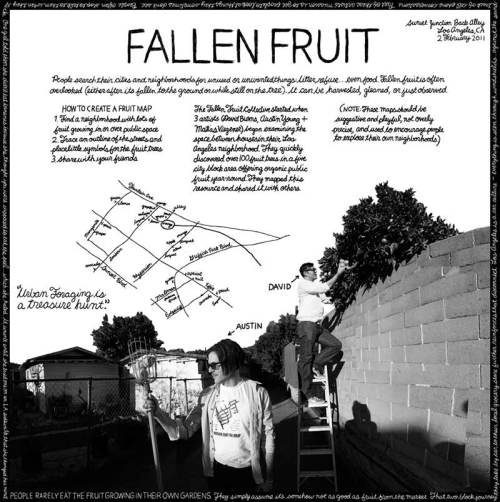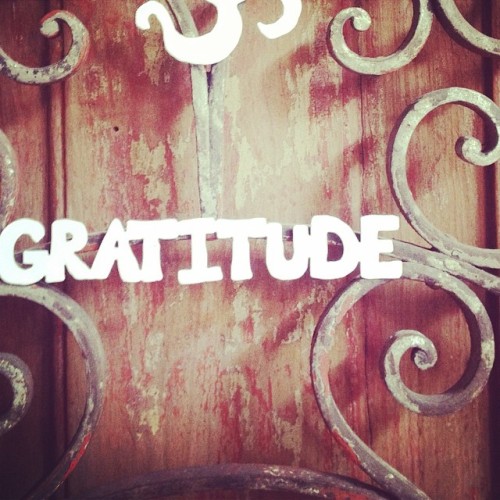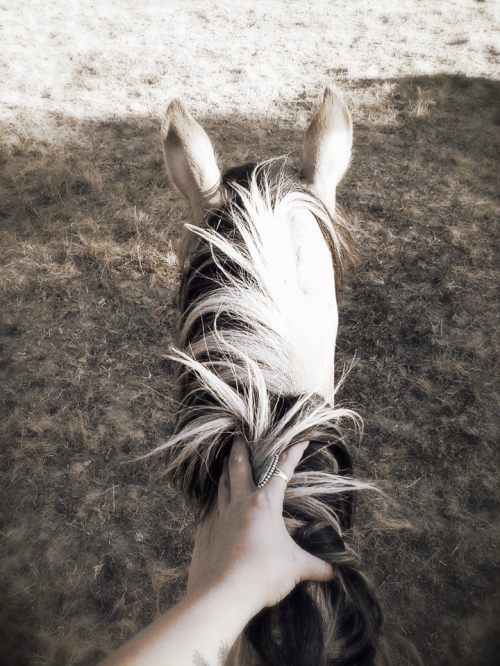When learning a new language, any good teacher will stress the importance of immersing yourself in it. You can do this by surrounding yourself with fluent speakers who will aid your brain in truly taking in whatever new way of communicating you’re studying. This way, you’re not just learning it; you’re living it.
My absolute favorite source for immersing myself in the language of sustainability is The Lexicon of Sustainability. The photograph you see above was created by the Lexicon as a project to help students discover and reconnect with their local food systems called “Project Localize”. The project has been a huge success and continues to inspire students and teachers to take their knowledge into their collective community and strike a match for sustainable change in their local food production system. I urge you to sit down and take some time to browse the education that The Lexicon of Sustainability has made easily accessible through picturesque scenes translated into just-the-right-combination-of words and short documentary videos available on their website. Find the beauty here: http://www.lexiconofsustainability.com/
I’m especially excited by their work because many of the farmers, ranchers, lexicographers, artists and researchers happen to have roots near my native habitat. This means that when I gaze out on the land that holds my heart and that still holds many mysteries for my mind, I smile to imagine these caretakers making change happen right over the next hillside. And as the effect of their efforts ripples out, I’ll feel and see the change in my homeland. Their research is thorough and their practices are the product of trial and error and an earnest desire to preserve the health of this place for the next, (hopefully) more sustainable generation. Their work is multi-faceted and unique to their livelihood, and similarly compelled by the Ancient saying, we do not inherit the Earth from our ancestors, we borrow it from our children.
So now that you know what awaits you at your fingertips, (as there is a true abundance of information on the language of sustainability once you decide its time to immerse yourself in it!) I’m going to change the subject, unfold a layer, or even be so bold as to pull on this thread and see where it’s connected to the rest of the world. Because frankly I can’t help but connect these random tangents that excite me back to the source that wells in my heart. Now, are you ready?
Here we go!
The one thing that all of these innovators, pioneers, and educators whose stories are shared on The Lexicon have in common is that they have dedicated themselves to undergoing an immersion in what makes their hearts beat and their minds race so that they can lead by example. The immersion I undergo in learning my beloved languages of Ayurveda and Animals is for one sole purpose: to learn to live it so I too can lead by example.
It is a simple lesson, but also a constant, difficult one: Those of us who want to change the world are told that we must first change ourselves. And those of us who stumble awkwardly and fall down constantly trying to be that change we want to see in the world then ask, (something like) “how did Ghandi make this look so easy?!” And the answer we receive is more often than not, “Why are you asking me? I don’t know. He was just being Ghandi.” However soon enough we inevitably find that Ghandi, for instance, didn’t just speak the language of change with grace, but he lived it with all of its growing pains. Finally then, the story of free and easy living and saving the world is demystified as we find it’s time to let go of wishing we could only be Ghandi, for example, and decide to learn to live this language that speaks graceful truth.
And so the fun begins!
Elizabeth Gilbert wrote in her groundbreaking novel Eat, Pray, Love as she set out to change her relationship to pleasure, devotion, and balance in Italy, India and Bali:
Destiny, I feel is also a relationship- a play between grace and willful self-effort. Half of it you have no control over, half of it is absolutely in your hands and your actions will show measurable consequences. Man is neither entirely a puppet of the gods, nor is he entirely a captain of his own destiny; he’s a little of both.
We gallop through our lives like circus performers balancing on two speeding side-by-side horses – one foot is on the horse called “fate” the other on the horse called “free will”. And the question you have to ask everyday is, Which horse is which? Which horse do I need to stop worrying about because it’s not under my control, and which do I need to steer with concentrated effort?
Our relationship to language and the way that we speak and live it, is one of our greatest tools for healing ourselves and realizing changes we pray for. We can pray for change, happiness and peace in our lives and in the world, but as Gilbert writes, our free will and fate is a relationship and half of the job is ours. We will see change when we immerse ourselves in the language that speaks to our hearts longing for happiness and our minds love of the greatest mystery, peace. I can’t tell you what that language is specifically for you, but I do believe that fundamentally and at it’s very core, it will embody the practice of Sustainability.
Sustainability is the ability to continue a defined behavior indefinitely. And if you’ve never cared to learn the definition of the word sustainability before now, well then I assure you could still be living a sustainable life, only you aren’t an etymology geek like myself. I cared to learn the definition and see how it’s changed throughout history, because if it isn’t embarrassingly evident by now, I am really interested in the roots of languages and how they are used to sustain relationships.
There is one frustrating, stubborn and hot-headed aspect to language that I have a problem with however, and that is it’s ability to cause a real lack of communication. Think of political jargon, empty promises and manipulating framing. The reality of language is, some people use it to show how much they care and others use it to show how much they know. Those of us who use language, whatever dialect it may be, to talk our way into the hearts of those we want to help are using it as a tool to show how much we care. This style of communicating can build a strong bridge to someone’s heart that will make words, eventually, unnecessary. And the opposite style of communication, which is not specific to any one dialect, is the use of language as a tool to show how much you know. This kind of use of language is tricky, as if you aren’t careful to spearhead communication in conjunction with the language of how much you care, you will become increasingly more reliant on words. This form is often abused by people acting selfishly or without consideration for others.
It can be hard for some people to pick up what place others are communicating from if they aren’t aware of where they are coming from themselves. However, the intelligence and intuition of animals can always detect what place people are communicating from; genuine or ingenuine. When working with animals, communicating how much you know will get you absolutely nowhere, unless they know first how much you care. This is something I’ve learned from the great Horseman and teacher, Buck Brannaman.
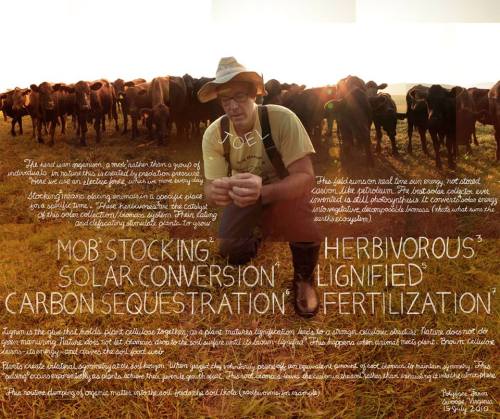
The Lexicon of Sustainability connects the dots and builds a beautiful language based in sustainability studies that’s easy on the eyes ~ http://www.lexiconofsustainability.com
Learning to communicate from a genuine place of caring so that we can get across how much we know is the foundation of the language of sustainability. If we can come from these places in our interactions with all things, then whatever language we speak, we will be speaking our graceful truth. My teacher of Ayurveda, DeAnna Batdorff says that if we speak equally from our hearts and our minds, our voice will come together and always communicate graceful truth. Our voice is a gift, and we are responsible for taking great care in sharing it with the world.
How much care this takes, in immersing ourselves in the language of sustainability is dependent upon what our graceful truth is. You’re the only one who knows what it’s like to be in your body and live with your heart and your mind. All I can really say knowing my body and the way it communicates and relates to the world, is that if I want to sustain my feelings of happiness in my heart and peace in my mind, I need to be working with animals to play with grace and willful self-effort and utilizing diagnostic tools of Ayurveda to help myself find that balanced place of belonging in the world where there is a hole in the shape of me, and live there.
To simply conclude, I suppose that living in a sustainable way for me, requires as much care as I truly care to sustain.



